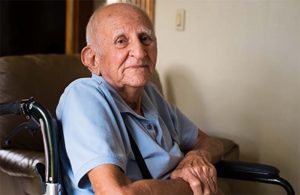What is Hospice?
Hospice care is a special kind of care that focuses on the quality of life for people and their caregivers who are experiencing an advanced, life-limiting illness with a life expectancy of 6 months or less if the illness were to run its normal course. Hospice care provides compassionate care for people in the last phases of incurable disease so that they may live as fully and comfortably as possible. When patients and families decide to shift their focus from curing an illness to alleviating its symptoms, hospice care can support their goals, enhance their quality of life, and honor their choices.
The hospice philosophy accepts death as the final stage of life: it affirms life, but does not try to hasten or postpone death. Hospice care treats the person and symptoms of the disease, rather than treating the disease itself. A team of professionals work together to manage symptoms so that a person’s last days may be spent with dignity and quality, surrounded by their loved ones. Hospice care is also family-centered – it includes the patient and the family in making decisions. Hospice care is about choices and how a person wishes to live his or her final days. It is about the quality, not the quantity of life.
In addition to symptom management, hospice provides necessary medicines, supplies and equipment, and complementary therapies such as music therapy, aromatherapy, massage therapy and pet therapy/visitation.
Read More
- While the Medicare or insurance hospice benefit is intended for a life expectancy of six months or less, many often live longer than terminally ill patients who continue to pursue curative treatment.
- Hospice care can occur in many places, including your home, hospitals, assisted living or nursing centers, and a hospice house which Sojourn Center for Hospice Care will be when built. While hospice care is usually provided in the home, home care is not feasible for everyone. The only other current choices in the New River Valley are hospital or nursing home care which are not designed to provide palliative, end-of-life care that is needed. A hospice house will meet this need.
- Although hospice staff will not physically live in your home, they visit frequently and are available “on call” at all times – seven days a week, 24 hours a day.
- Hospice is appropriate for patients with a variety of end-of-life conditions, including cancer, congestive heart failure, COPD, kidney disease, “old age,” Alzheimer’s and other forms of dementia.
- Hospice care also includes the support of families after the death including bereavement care for the surviving loved ones.
When should hospice care start?
 Hospice care is used when a disease gets to the point when treatment can no longer cure it. In general, hospice care should be used when a person is expected to live about 6 months or less if the illness runs its usual course. People with advanced, incurable diseases should have a discussion with their family members and doctor to decide together when hospice care should begin.
Hospice care is used when a disease gets to the point when treatment can no longer cure it. In general, hospice care should be used when a person is expected to live about 6 months or less if the illness runs its usual course. People with advanced, incurable diseases should have a discussion with their family members and doctor to decide together when hospice care should begin.
Studies show hospice care often is not started soon enough. Sometimes the doctor, patient, or family member will resist hospice because they think it means “giving up” or that there’s no hope. In fact, hospice give great hope for the patient to focus on his or her priorities and comfort during the time remaining.
It’s important to know that you can leave hospice and go into active treatment any time you want. But the hope that hospice brings is a quality life, making the best of each day during the last stages of advanced illness.
Some doctors don’t bring up hospice, so the patient or family member might decide to start the conversation. If your treatment isn’t working anymore and you’ve run out of treatment options, you might want to ask your doctor or a member of your care team about hospice.
What is the difference between hospice and palliative care?
 Hospice and palliative care both focus on comfort, though there are some differences.
Hospice and palliative care both focus on comfort, though there are some differences.
Hospice care is typically provided to a patient who is no longer pursuing a cure for a terminal illness or condition.
Palliative care is usually provided to patients and their caregivers while hope for improvement or remission remains. A patient receiving palliative care may or may not continue treatment aimed at a cure.
Frequently Asked Questions About Hospice
Q: Who qualifies for hospice care?
 A: Anyone who has been diagnosed with any illness which the physicians feel has a life expectancy of six months or less. Whether the diagnosis is a cancer, or just “old age” the patient may obtain hospice care if the expectation is the patient will likely not live more than six months, and the patient and family wish for control of symptoms, comfort, and palliative-oriented care.
A: Anyone who has been diagnosed with any illness which the physicians feel has a life expectancy of six months or less. Whether the diagnosis is a cancer, or just “old age” the patient may obtain hospice care if the expectation is the patient will likely not live more than six months, and the patient and family wish for control of symptoms, comfort, and palliative-oriented care.
Sometimes the patient or family are worried that it will be “too soon” because they don’t want to lose hope. A hospice agency will come and talk to you and your loved ones at home, free of charge, to help you gather information to make a decision you feel good about. Due to the uniqueness of every patient– at such a difficult time of change–it often helps to seek further advice from the people who really know about end-of-life care: a hospice team. If the patient is in the hospital already a request for a palliative consultation can be made.
In summary: a physician must “order” hospice but anyone can request a hospice agency to schedule an initial, informal visit for information and informal evaluation. Diagnoses that often qualify include cancer, heart disease, pulmonary/lung disease, kidney disease, liver disease, stroke/coma, dementia/Alzheimer’s, ALS, and HIV.
Q: If I have hospice, can I keep my own doctor?
A: Yes, absolutely. But there will be a hospice team physician, typically an expert in end-of-life care, who will act as a resource for the patient and the hospice team looking after the patient.
 Q: What services are provided through hospice?
Q: What services are provided through hospice?
A: Hospice provides a number of services to benefit the patient and caregivers. These include 24/7 on-call nursing care, nursing aide assistance for bathing and personal hygiene, social workers to assist with emotional and financial help, chaplains for spiritual support, bereavement counselors for family members of the deceased, and volunteers who visit patients, provide support and companionship and share interests, hobbies and light recreational activities. Hospice care may also include complementary therapies such as music, massage, aromatherapy, pet therapy, hypnotherapy and end-of-life doulas. Some hospices provide a program to honor veterans and acknowledge their unique experience at end of life.
Q: Who pays for hospice care?
A: Hospice care is actually less expensive than care provided in a traditional medical setting. Paying for end-of-life care depends on the type and place of care and the kind of insurance a person has. Medicare, Medicaid, private medical insurance, long-term care insurance, Veterans Health Administrative (if VA-eligible), or the patient and his or her family are common sources of payment.
Q: Where can hospice care be received?
A: Hospice care may be provided in multiple environments, including nursing homes, long-term care facilities, private homes, or hospice houses. Whatever the environment, hospice must establish a contract with the facility/provider.
Q: Does southwest Virginia have a hospice house?
A: Unfortunately, a hospice house does not currently exist in southwest Virginia. That is why Sojourn Center for Hospice Care is needed in our region to complete the needed continuum of care to the end of life.
Donate
When you support the mission of Sojourn Center, you help give terminally ill people and their families the opportunity to experience end-of-life care in a peaceful, meaningful way without discomfort. Through your support, you can honor the memory of your loved ones while helping others.
“Our ultimate goal, after all, is not a good death but a good life to the very end.”
